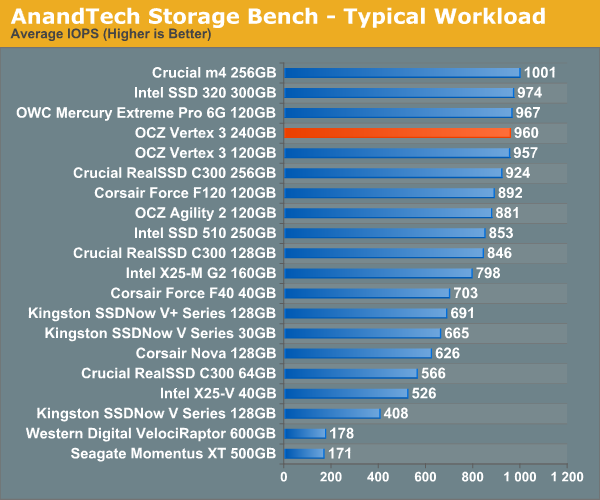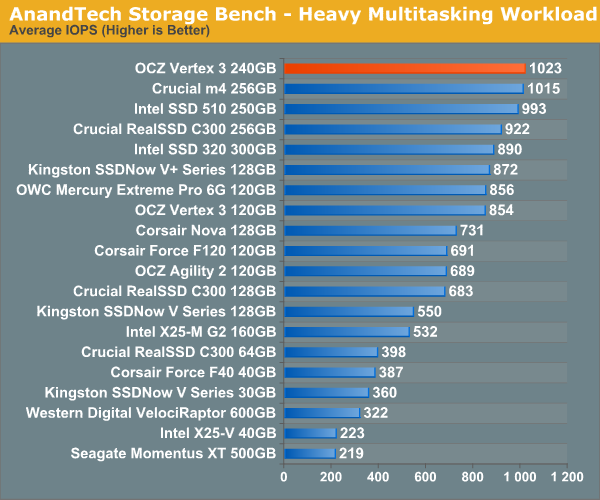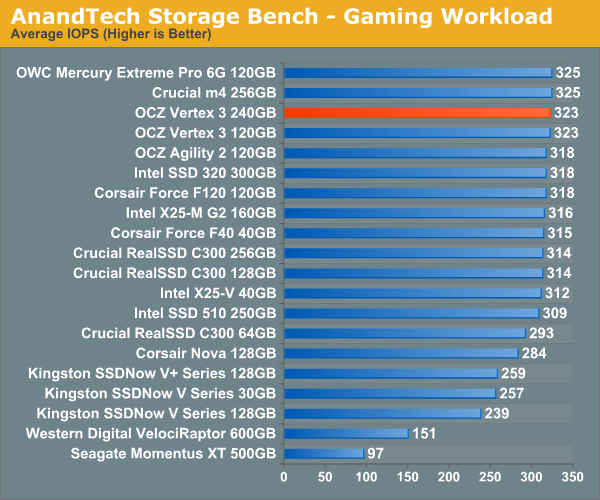OCZ Vertex 3 (240GB) Review
by Anand Lal Shimpi on May 6, 2011 1:50 AM ESTAnandTech Storage Bench 2010
To keep things consistent we've also included our older Storage Bench. Note that the old storage test system doesn't have a SATA 6Gbps controller, so we only have one result for the 6Gbps drives.
The first in our benchmark suite is a light/typical usage case. The Windows 7 system is loaded with Firefox, Office 2007 and Adobe Reader among other applications. With Firefox we browse web pages like Facebook, AnandTech, Digg and other sites. Outlook is also running and we use it to check emails, create and send a message with a PDF attachment. Adobe Reader is used to view some PDFs. Excel 2007 is used to create a spreadsheet, graphs and save the document. The same goes for Word 2007. We open and step through a presentation in PowerPoint 2007 received as an email attachment before saving it to the desktop. Finally we watch a bit of a Firefly episode in Windows Media Player 11.
There’s some level of multitasking going on here but it’s not unreasonable by any means. Generally the application tasks proceed linearly, with the exception of things like web browsing which may happen in between one of the other tasks.
The recording is played back on all of our drives here today. Remember that we’re isolating disk performance, all we’re doing is playing back every single disk access that happened in that ~5 minute period of usage. The light workload is composed of 37,501 reads and 20,268 writes. Over 30% of the IOs are 4KB, 11% are 16KB, 22% are 32KB and approximately 13% are 64KB in size. Less than 30% of the operations are absolutely sequential in nature. Average queue depth is 6.09 IOs.
The performance results are reported in average I/O Operations per Second (IOPS):

If there’s a light usage case there’s bound to be a heavy one. In this test we have Microsoft Security Essentials running in the background with real time virus scanning enabled. We also perform a quick scan in the middle of the test. Firefox, Outlook, Excel, Word and Powerpoint are all used the same as they were in the light test. We add Photoshop CS4 to the mix, opening a bunch of 12MP images, editing them, then saving them as highly compressed JPGs for web publishing. Windows 7’s picture viewer is used to view a bunch of pictures on the hard drive. We use 7-zip to create and extract .7z archives. Downloading is also prominently featured in our heavy test; we download large files from the Internet during portions of the benchmark, as well as use uTorrent to grab a couple of torrents. Some of the applications in use are installed during the benchmark, Windows updates are also installed. Towards the end of the test we launch World of Warcraft, play for a few minutes, then delete the folder. This test also takes into account all of the disk accesses that happen while the OS is booting.
The benchmark is 22 minutes long and it consists of 128,895 read operations and 72,411 write operations. Roughly 44% of all IOs were sequential. Approximately 30% of all accesses were 4KB in size, 12% were 16KB in size, 14% were 32KB and 20% were 64KB. Average queue depth was 3.59.

The gaming workload is made up of 75,206 read operations and only 4,592 write operations. Only 20% of the accesses are 4KB in size, nearly 40% are 64KB and 20% are 32KB. A whopping 69% of the IOs are sequential, meaning this is predominantly a sequential read benchmark. The average queue depth is 7.76 IOs.











90 Comments
View All Comments
explorer007 - Monday, May 23, 2011 - link
I got exacltly same problem even after firmware 2.06! Anyone better luck?beelzebub253 - Saturday, May 28, 2011 - link
For those of you using Vertex 3 in AHCI mode with the Intel RST drivers, have you tried the LPM Disable fix discussed below?http://forums.crucial.com/t5/Solid-State-Drives-SS...
Check the Event Viewer (System Logs) for an error about iaStor: "did not respond within the timeout period". The entries will be at the exact time of your freeze-ups. Mine had the same problem until I applied the reg fix.
sequoia464 - Wednesday, May 11, 2011 - link
I wonder how this matches up against the Samsung 470.I guess we will never know as it appears that the Samsung 470 has still not been reviewed here at AnandTech.
Hint.
tannebil - Thursday, May 12, 2011 - link
I just installed a 120GB IOPS and I'm seeing ~240MB/s in AS SSD for sequential write. That's 50% higher than you got in your test last month of the regular 120GB model. My understanding is that the sequential performance should be quite similar between the IOPS and regular model so there's something odd going on. My sequential read results match yours.If you look across all the different tests, the AS SSD write results seem to be an outlier since the drive is a great performer in all the rest of the benchmarks. The OWC driver had the same odd results so maybe it's something specific to the SF 2200 controller and your test platform.
My system is a Biostar TH67+ H67 motherboard with a i5-2400 processor with the SSD is connected to an SATAIII port as the boot drive (Windows 7 HP).
johnnydolk - Monday, May 16, 2011 - link
Here in Denmark the Vertex 3 retails slightly cheaper than the Intel 510, but at 25% more than the Crucial M4, which brings the latter on par with the older Vertex 2. This is for the 240/250/256GB versions.I guess the M4 is the one to get if value for money matters?
werewolf2000 - Friday, May 27, 2011 - link
Hi, I'm a bit disappointed. Read all the reviews and was excited about Vertex 3.Got it recently ... but, I'm sorry to say it, it is not good. It maybe fast, but it is freezing. For a little while just sometimes, but it is. It has some consequences, for example when you play mp3, you hear some annoying sounds every 1 - 2 minutes. Seems I'm not the only one having these issues, the tricks from here http://geekmontage.com/texts/ocz-vertex-3-freezes-... help partially, but not fully.
I had Intel G1 some time ago, it behaved similarly after several months of usage, Intel G2 didn't have such issues at all. Now the "best" Vertex 3 has these problems from the beginning (I had two of them, one failed immediately, the second one still lives but freezes).
Maybe, Anand, you could test things like that? Speed is not all, freezing is VERY annoying.
zilab - Saturday, June 4, 2011 - link
Hi Anand,
Great article, just a question:
WIll having a pair of 120GB in RAID 0, make this a non-issue? in terms of speed and resiliency ?
Mohri - Tuesday, August 23, 2011 - link
Thanks Anand for nice reviews,i got macbook pro 2011- Intel i7 2.2 - 8gb ram - 1gb ddr5 video
and i want to install a ssd for it, now i wanted to ask you to recommend me which brand is better for me?
Thank you very much
samehvirus - Saturday, August 27, 2011 - link
To make it short for you all .... OCZ rushed the drive to the market, they want you to BETA Test it, you are stuck with them the moment you buy it, they will keep you in their "RMA or wait for firmware Loop" this SSD is a big "AVOID IT" for main drive (OS+Programs/etc) it will annoy you to no end and a solution atm as of may 26 does not exist neither OCZ admit it yet even when plenty of people are reporting the same issue, they will always try to blame your other hardware or software for the BSOD and never about their own SSDIf you want to be a beta tester go ahead and buy it, OCZ got no solution to offer atm, they are basically selling a product that works 90% of the time so some users wont notice it (those who use their computer 1-2hours a day) if you leave your computer +5hours a day or on all the time prepare to a daily BSOD, Until OCZ offer a solution .
paul-p - Saturday, October 22, 2011 - link
After 6 months of waiting for OCZ and Sandforce to fix their firmware from freezes and BSOD's, I can finally say it is fixed. No more freezes, no more BSOD's, performance is what is expected. And just to make sure all of the other suggestions were 100% a waste of time, I updated the firmware and DID NOT DO anything else except reboot my machine and magically everything became stable. So, after all these months of OCZ and Sandforce blaming everything under the sun including:The CMOS battery, OROM's, Intel Drivers, Intel Chipsets, Windows, LPM, Hotswap, and god knows what else, it turns out that none of those issues had anything to do with the real problem, which was the firmware.
While I'm happy that this bug is finally fixed, Sandforce and OCZ have irrepairably damaged their reputation for a lot of users on this forum.
Here is a list of terrible business practices that OCZ and Sandforce have done over the last year...
OCZ did not stand behind their product when it was clearly malfunctioning is horrible.
OCZ did not allow refunds KNOWING that the product is defective is ridiculous.
OCZ nor Sandforce even acknowledged that this was a problem and steadfastly maintained it only affected less than 1% of users.
The fact that OCZ claims this bug affected 1% of users is ridiculous. We now know it affected 100% of the drives out there. Most users just aren't aware enough to know why their computer froze or blue screened.
OCZ made their users beta test the firmwares to save money on their own testing
OCZ did not have a solution but expected users to wipe drives, restore from backups, secure erase, and do a million other things in order to "tire out" the user into giving up.
OCZ deletes and moves threads in order to do "damage control and pr spin".
But the worst sin of all is the fact that it took almost a year to fix such a MAJOR bug.
I really hope that OCZ learns from this experience, because I'm certain that users will be wary of Sandforce and OCZ for some time. It's a shame, because now that the drive works, I actually like it.